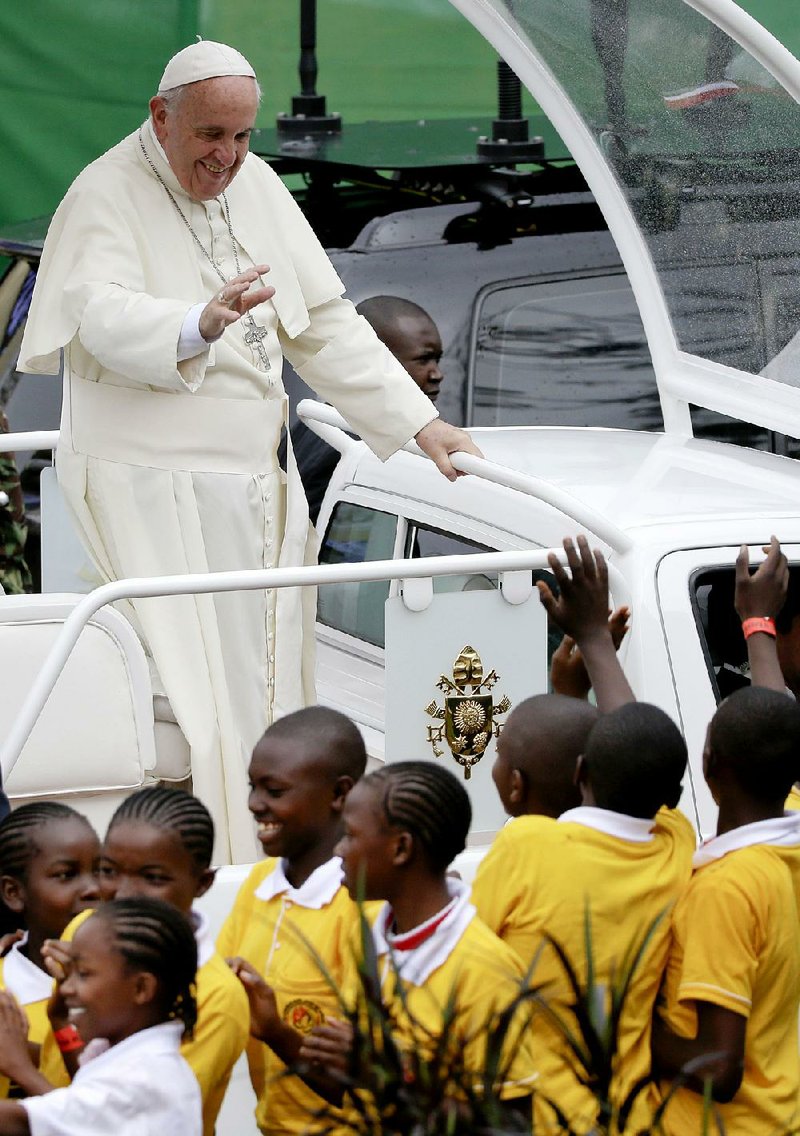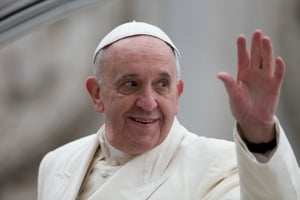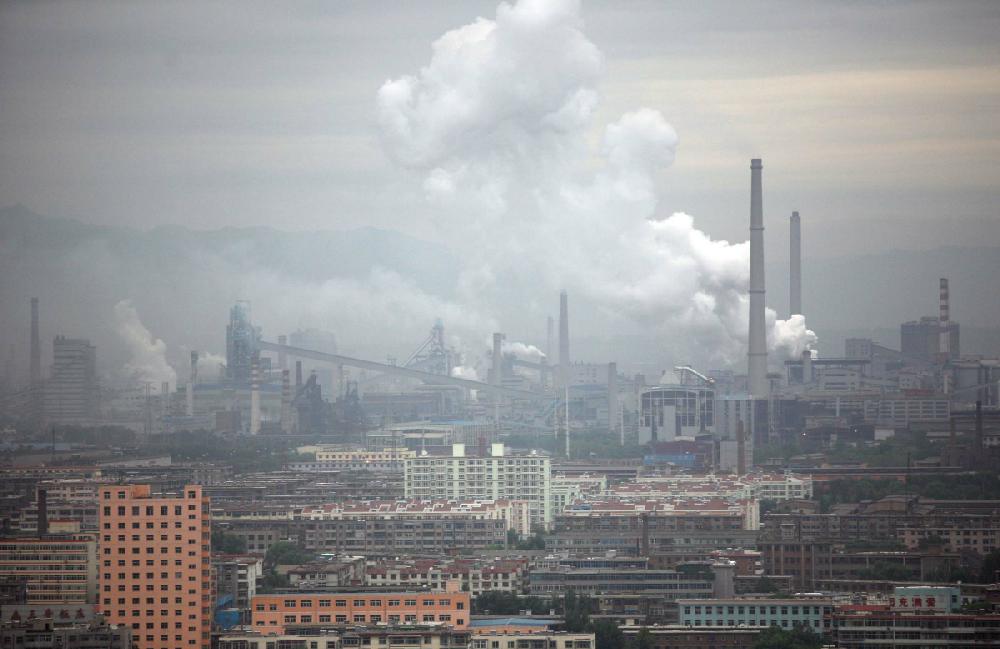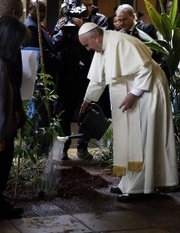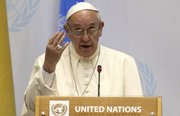NAIROBI, Kenya -- Pope Francis warned Thursday that it would be "catastrophic" for world leaders to let special-interest groups get in the way of a global agreement to curb fossil-fuel emissions.
The pope took his environmental message to the heart of Africa as nations prepared for climate-change talks in Paris next week.
Francis issued the warning in a speech to the U.N.'s regional office in Nairobi after celebrating his first public Mass on the continent. The joyous, rain-soaked ceremony before 300,000 faithful saw the Argentine pope being serenaded by Swahili singers, swaying nuns, Maasai tribesmen and dancing children dressed in the colors of Kenya's flag.
The pope has made ecological concerns a hallmark of his nearly 3-year-old papacy, issuing an encyclical earlier this year that paired the need to care for the environment with the need to care for humanity's most vulnerable. Francis argues that the two are interconnected because the poor often suffer the most from the effects of global warming and they are largely excluded from today's fossil-fuel-based global economy seen by some as heating up the planet.
On Thursday, Francis repeated that message but took particular aim at those who reject the science behind global warming.
"It would be sad, and dare I say even catastrophic, were special interests to prevail over the common good and lead to manipulating information in order to protect their own plans and interests," Francis said.
Francis' message was praised by NASA historian Erik Conway, who co-wrote the 2010 book Merchants of Doubt, which detailed the attempts by some institutions and like-minded scientists to discredit the science behind global warming and spread confusion in the public.
Conway said it was difficult to determine today how much money is being directed into climate-change denial because much of it goes through foundations.
"But what that funding has achieved is the nearly complete conversion of Republican Party leadership into denial of human-caused climate change as well as public confusion over the content of the science," he said in an email.
Francis, who has said global warming is "mainly" man-made, said the world was faced with a stark choice in Paris: either improve or destroy the environment.
He said he hoped the Paris talks would approve a "transformational" agreement to fight poverty and protect the environment by developing a new energy system that depends on minimal fossil-fuel use.
"Many are the faces, the stories and the evident effects on the lives of thousands of people for whom the culture of deterioration and waste has allowed to be sacrificed before the idols of profits and consumption," he said. "We cannot remain indifferent in the face of this. We have no right."
Thursday was the second day in a row that Francis had touched on environmental concerns after he arrived in Kenya for a six-day pilgrimage that also takes him to Uganda today and the conflict-ridden Central African Republic.
Francis' first full day in Africa began with a meeting with about 25 Kenyan Christian and Muslim leaders. He warned them that they had little choice but to engage in dialogue to guard against the "barbarous" Islamic extremist attacks that have struck the country.
Francis also spoke of the string of recent terrorist attacks in the world, condemning the way young people have been "radicalized in the name of religion to sow discord and fear."
The pope has described the amalgam of conflicts pervading the globe as a "piecemeal" Third World War.
He cited the two largest terrorist attacks in Kenya's recent history -- the 2013 assault on the Westgate Mall, in which 67 people died, and the attack this year on Garissa University, where 147 were killed.
Francis recognized Kenya's struggles against Islamist extremism, saying he knew the two attacks "are fresh in your minds."
He also discussed the ways extremism is used "to sow discord and fear, and to tear at the very fabric of our societies." He stressed the need for religious leaders to heal those wounds, shifting his message back to the universal.
"His holy name must never be used to justify hatred and violence," Francis said. "Dialogue is not a luxury. It is not something extra or optional but essential."
10,000 Police Present
He later celebrated Mass before about 300,000 people at the University of Nairobi, where he received a raucous welcome from the crowd as he zoomed around in his open-sided popemobile, some 10,000 police providing security.
Some people had been at the university since 3 a.m., enduring heavy showers that turned the grounds into enormous, slick mud puddles. Others waited in lines 1.8 miles long to get close to the venue.
"I am a Catholic, and I believe he is godsend," said Nelly Ndunge, 29, as she waited to see Francis at the Mass. She said Francis' visit to Kenya was a blessing because it would renew her faith -- and had boosted her printing business: She said she had already sold nearly 3,000 copies of a 2016 calendar with the pope's portrait on it.
Still others turned back, fearing a stampede.
"We were all disappointed," said Sarah Ondiso, a senior government official. "The organizers could have done better."
The size of the crowd -- estimated by both police and the Vatican -- was far smaller than the 1.4 million that Kenyan authorities had expected after declaring Thursday a national holiday. Vatican officials had predicted a maximum of a half-million people and said the lower number was apparently due to accreditation and ticketing problems.
In his homily, Francis appealed for traditional family values, calling for Kenyans to "resist practices which foster arrogance in men, hurt or demean women, don't care for the elderly and threaten the life of the innocent unborn."
The African church is among the most conservative in the world, and African bishops have been at the forefront in insisting that traditional church teachings on marriage and sexuality, and its opposition to abortion, be strongly emphasized.
Francis obliged but also stressed issues of his own concern: He called for Kenyans to shape a more just society that looks out for the poor and to "reject everything that leads to prejudice and discrimination, for these things are not of God."
Information for this article was contributed by Nicole Winfield, Tom Odula and Seth Borenstein of The Associated Press and by Kevin Sieff and Michelle Boorstein of The Washington Post.
A Section on 11/27/2015
